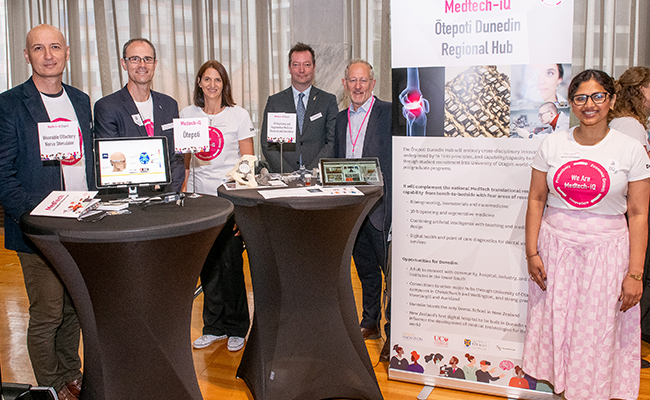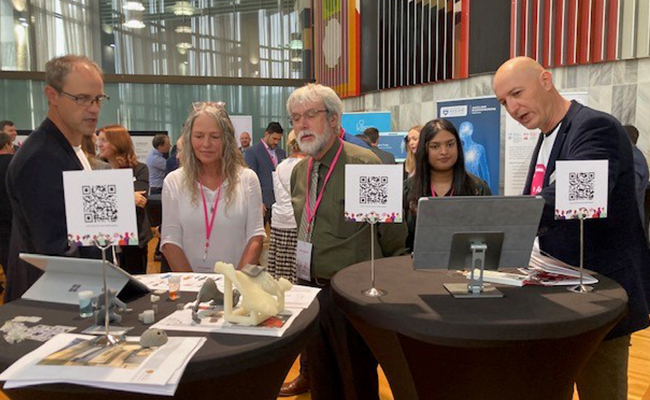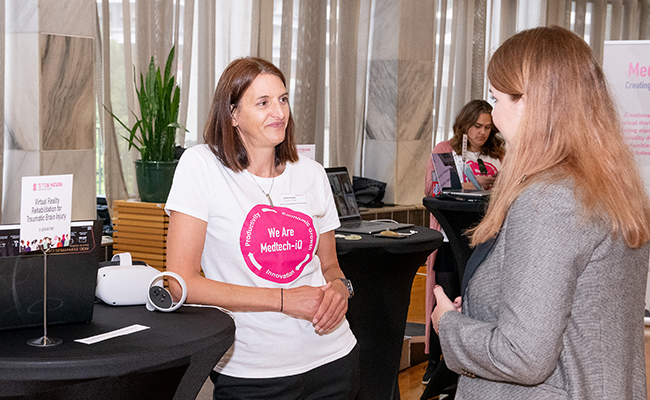
The Otago contingent at the MedTech Innovation Showcase, highlighting the University's contribution and commitment to this flourishing industry. From L-R: Associate Professor Yusuf O Cakmak, Professor Tim Woodfield, Dr Jo Nunnerley, Dr Martin Gagnon, Professor J. Haxby Abbott and Dr Carthika Luxmanan.
Otago researchers took centre stage at the MedTech Innovation Showcase last month, representing the University's growing contribution to New Zealand's expanding and lucrative medical technology sector.
Organised by the Consortium for Medical Device Technologies (CMDT) and Te Tītoki Mataora (TTM), the showcase also featured the launch of MedTech-iQ Aotearoa, a virtual collaborative ecosystem led by CMDT, with four physical hubs - Tāmaki Makaurau Auckland, Pōneke Wellington, Ōtautahi Christchurch and Ōtepoti Dunedin.
The four innovation hubs bring together five universities, Callaghan Innovation and three Te Whatu Ora hospitals, with other government health providers, the technology industry, investors, and communities. Each hub will contribute its areas of research and business strength and collaborate nationally.
At NZ$2 billion and growing, the New Zealand MedTech sector has more than doubled in size in ten years says Otago's Dr Carthika Luxmanan, Business Development Manager, Research & Enterprise and CMDT Steering Committee member.
“With our presence in Dunedin, Christchurch, and Wellington, the University can contribute to the work in three hubs and be a leading industry voice in the South Island.”
Among the Otago research showcased was a wearable olfactory nerve stimulator, spearheaded by Associate Professor Yusuf O Cakmak, Department of Anatomy.
Analysing dysfunction in the olfactory system contributes towards understanding diseases such as Parkinson's and Alzheimer's and post-COVID complications.
Associate Professor Cakmak determined the optimised electrode placements to stimulate the olfactory nerve superficially, paving the way for developing the first non-invasive wearable olfactory nerve stimulator.
He says the event was a 'unique opportunity for the Ōtepoti Dunedin hub'.
“We were able to demonstrate our novel medtech innovations to the key players in the Aotearoa health tech ecosystem, where the transformation of the health system is taking place.”

Professor Tim Woodfield (left) and Associate Professor Yusuf O Cakmak (right) explain the intricacies of biofabrication and olfactory nerve stimulation.
Representing Otago's participation in the Christchurch hub was Dr Jo Nunnerley, from the Department of Orthopaedic Surgery & Musculoskeletal Medicine, sharing her research into Virtual Reality (VR) as a safe, controllable environment to enhance rehabilitation from traumatic brain injury (TBI).
Her team's work has contributed to the development of NeuralXR, a VR program co-designed with clinicians and patients to understand and manage cognitive fatigue.
NeuralXR recreates a café environment where patients recovering from TBI experience challenges – from ordering coffee to being in a large group setting and allows them to practice coping mechanisms while learning skills such as social interactions and problem solving.
The programme can be delivered remotely says Dr Nunnerley, with the potential to improve services to populations such as Māori, Pacific, and rural communities.
Also present was Professor Tim Woodfield, from the same department, whose research is focused on multidisciplinary 3D bioprinting and regenerative medicine.
Otago's Christchurch campus houses New Zealand's most advanced biofabrication facility, developing biomaterials like (stem) cells 3D bioprinted to a patient's specific anatomy to allow repair of damaged cartilage and bones or regenerate sections of tissue removed due to cancer.
“Our participation highlighted successful examples of where University of Otago medtech research and clinical translation is helping our clinicians and our Aotearoa communities access new healthcare solutions and improve outcomes.”

Dr Jo Nunnerley presents the NeuralXR, a VR programme that can help rehabilitation from traumatic brain injury, irrespective of patient location.
An important aim says Dr Luxmanan is to improve health outcomes for Aotearoa through creating a vibrant commercialisation pathway for medtech innovations.
As the Ōtepoti representative, Dr Luxmanan is working towards growing the regional hub, creating a dynamic network of medtech expertise in and around Dunedin.
“With the depth of expertise across the university, the new hospital build, and local medtech companies, Dunedin has a lot to offer as a MedTech-iQ hub, she says.
“The medtech sector in Aotearoa is flourishing, and Medtech-iQ Ōtepoti will play a key role in turning ideas into tangible outcomes.”
- Kōrero by Sandra French, Internal Communications Adviser